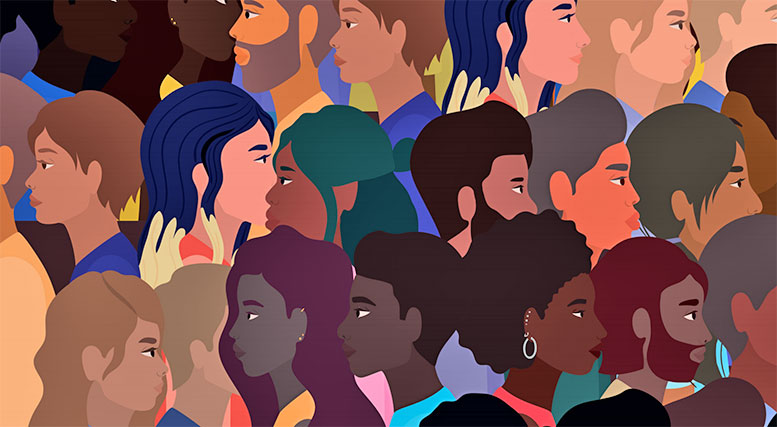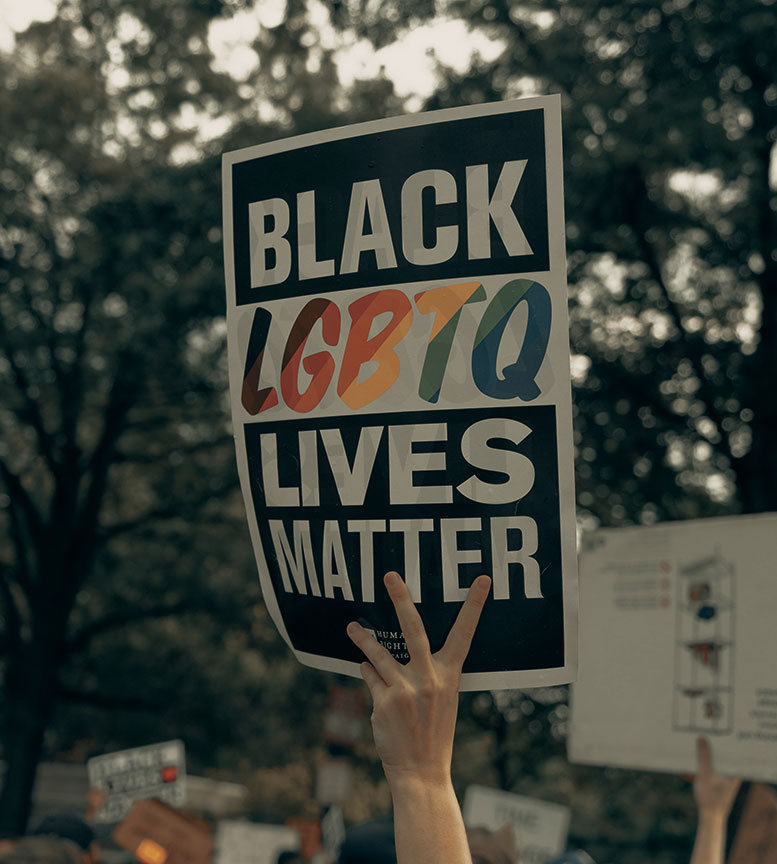The Equality Acts Is Vital To All Underrepresented Groups; May Pass In The Senate
WASHINGTON—Today lawmakers in the U.S. Senate introduced the Equality Act to update federal law to include explicit and comprehensive nondiscrimination protections for LGBTQ+ Americans. The Equality Act would establish explicit clear and tangible anti-discrimination protections for LGBTQ+ people across fundamental aspects of everyday life — employment, housing, credit, education, public spaces and services, federally funded programs, and jury service, according to the Human Rights Campaign‘s website.
“Passing the Equality Act is a critical step toward ensuring that LGBTQ people — and all people — can protect their families and contribute to their communities and workplaces,” said Janson Wu, GLAD Executive Director. “It also ensures the fairness and dignity all Americans need and deserve. We call on Congress to follow the lead of the American people and send the Equality Act to President Biden for his signature this session.”
The HRC explains, the Equality Act would amend current “civil rights law—including the Civil Rights Act of 1964, the Fair Housing Act, the Equal Credit Opportunity Act, the Jury Selection and Services Act, and several laws regarding employment with the federal government—to explicitly include sexual orientation and gender identity as protected characteristics. The legislation also amends the Civil Rights Act of 1964 to prohibit discrimination in public spaces and services and federally funded programs on the basis of sex.”
House of Representatives
A week prior, lawmakers in the U.S. House of Representatives introduced H.R. 5, the Act.
“The introduction of the Equality Act is our nation’s opportunity to ensure long-sought nondiscrimination protections for all LGBTQ+ Americans in all areas of life,” said Kasey Suffredini, CEO and national campaign director of Freedom for All Americans. “LGBTQ advocates have long sought to secure freedom and fairness under the law since the first federal nondiscrimination measure was introduced in Congress in 1974, and there is now support from leadership in both chambers of Congress and in the White House to achieve that goal. The Equality Act will make clear that LGBTQ people must be treated with dignity and respect, and it will bring our country closer to an America that truly ensures liberty and justice for all.”
More than just LGBTQ+ People
The newest report from MAP outlines the ways in which the Equality Act is vital legislation for LGBTQ+ people, as well as for women, people of color, immigrants, and people of minority faiths. This report was released in partnership with the Center for American Progress, Lawyers for Civil Rights, National Center for Transgender Equality, National Partnership for Women and Families, and the National Women’s Law Center.
MAP’s interactive Equality Maps provide a comprehensive state by state look at the legal protection landscape for LGBTQ+ people.
Reacting to the House announcement last week, David J. Johns, executive director of the National Black Justice Coalition (NBJC), a leading civil rights organization dedicated to the empowerment of Black LGBTQ+/SGL people, including people living with HIV/AIDS, stated that the Act would protect more than just the LGBTQ+ community.
“The Equality Act of 2021 does much more than protect members of the LGBTQ+/SGL community, which is why its passage would be especially impactful for people who are both Black and LGBTQ+/SGL,” said Johns. “As a tall, Black, same gender loving man, I have been followed in stores by employees who assumed that I might steal something. I have worried that employers might mistake photos with friends as pictures of me and my partner, or discriminate against me as a result of ignorance and normative privilege.
“I have witnessed and actively advocated against Black people being discriminated against in the criminal justice system, the medical-industrial complex, traditional public schools, and other programs funded by my tax dollars. I have seen my siblings fired from or excluded from jobs because of how they express their race and gender through the act of wearing locs in their hair, or skirts in places where people assume only women and girls should enjoy the fun that comes with fashion. The Equality Act would finally provide everyone with legal protections designed to prevent biases, discrimination, and hate crimes.”
Widespread support
Immediately following the introduction, 156 state and local organizations in nearly all 50 states announced their support and highlighted the urgent need for the legislation. The letter reads in part: “The Equality Act is a significant step forward for the LGBTQ+ community, and we are committed to mobilizing our communities to urge Congress to swiftly pass this important bill. We’ll be working in these lawmakers’ backyards to make sure they know this is about people, not politics.” The full joint letter can be found here: https://eqfed.org/EqualityActIntro.
“The reintroduction of the Equality Act by a broad coalition in Congress starts to carve a clear path to LGBTQ equality and marks a new day for our country,” said Imani Rupert-Gordon, NCLR Executive Director. “The harsh reality is that current anti-discrimination protections fall far short of protecting everyone in our communities, leaving behind LGBTQ people and people of color who continue to face disproportionate discrimination in nearly every aspect of their lives. The Equality Act builds on the important legacy of the Civil Rights Act of 1964 and would provide nondiscrimination protections that include LGBTQ people for the very first time, while also extending protections to the most underrepresented in our communities in housing, healthcare, education, and other vital parts of everyday life.”
Five years ago, North Carolina passed the nation’s most extreme anti-LGBTQ state law, banning transgender people from using public restrooms. Following the expiration of that law this past December, six cities and counties have now enacted LGBTQ nondiscrimination protections. As recently as last month, 14 cities in West Virginia passed municipal ordinances in support of LGBTQ nondiscrimination protections. Finally, in Pennsylvania, legislation protecting LGBTQ people from discrimination has been introduced since 1976. It is currently the only state in the Northeast without LGBTQ nondiscrimination protections, although dozens of municipalities have passed ordinances.
Late last year, more than 140 mayors, city councilors, and municipal leaders in all 29 states lacking comprehensive LGBTQ nondiscrimination protections delivered a letter to their members of Congress urging passage at the federal level.
Bipartisan consensus for nationwide LGBTQ nondiscrimination protections is rising quickly. Public support is at an all-time high and polls show that a growing bipartisan supermajority of Americans supports protecting LGBTQ people from discrimination: in a 2020 PRRI survey, more than eight in ten Americans (83%), including majorities of Independents (85%) and Republicans (68%), expressed support for these protections.
Failed in 2019
The Equality Act passed in a historic bipartisan vote in the U.S. House of Representatives in 2019 but failed to advance in the Senate. In addition to providing LGBTQ+ nondiscrimination protections, the Equality Act will also provide protections from discrimination based on sex, race, color, national origin, and religion that are additional to those already afforded under federal law.
The urgency and momentum for LGBTQ+ nondiscrimination protections over recent years is undeniable. According to a 2020 study, one in three LGBTQ Americans faced discrimination in the previous year, including three in five transgender Americans.
Bipartisan consensus for nationwide LGBTQ nondiscrimination protections is rising quickly. Public support is at an all-time high and polls show that a growing bipartisan supermajority of Americans support protecting LGBTQ people from discrimination: in a 2020 PRRI survey, more than eight in ten Americans (83%), including majorities of Independents (85%) and Republicans (68%), expressed support for these protections.
The Equality Act would update federal civil rights laws to ensure explicit and comprehensive protections for LGBTQ+ people from discrimination, including in housing, employment, federally-funded programs and services, and public places such as restaurants, stores, hospitals, and more. A majority of states currently lack these protections, leaving more than 50% of the country’s LGBTQ+ population — millions of Americans — vulnerable to discrimination.
Freedom for All Americans is the bipartisan campaign to secure full nondiscrimination protections for LGBTQ people nationwide. Our work brings together Republicans and Democrats, businesses large and small, people of faith, and allies from all walks of life to make the case for comprehensive nondiscrimination protections that ensure everyone is treated fairly and equally.
The National Black Justice Coalition (NBJC) is America’s leading civil rights organization dedicated to the empowerment of Black lesbian, gay, bisexual, transgender, queer+, and same gender loving (LGBTQ+/SGL) people, including people living with HIV/AIDS.
MAP‘s mission is to provide independent and rigorous research, insight, and communications that help speed equality and opportunity for all. MAP works to ensure that all people have a fair chance to pursue health and happiness, earn a living, take care of the ones they love, be safe in their communities, and participate in civic life.
The National Center for Lesbian Rights (NCLR) is a national legal organization committed to advancing the human and civil rights of the lesbian, gay, bisexual, transgender, and queer community through litigation, public policy advocacy, and public education. Since its founding, NCLR has maintained a longstanding commitment to racial and economic justice and the LGBTQ community’s most vulnerable.
[From a Compilation of Press Releases]








